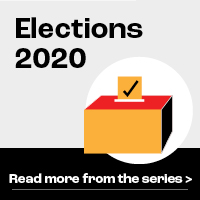We know Donald Trump hates Obamacare. We know Joe Biden loves it. What else have the two presidential contenders said about the healthcare system?

Adi Talwar
Democratic nominee Biden has not embraced Medicare for All but his platform pledges a new public insurance option that would negotiate lower prices with hospitals and other health care providers.With less than a month left until the presidential election, health care looms large in the national psyche: The United States has seen more than 213,000 deaths so far to the COVID-19 pandemic, according to the World Health Organization, and 5.4 million American workers—including 298,000 New Yorkers—lost health insurance coverage between February and May as a result of job losses, a report from the consumer advocacy group Families USA found.
Voters are indeed concerned about it: A February poll from NBC News and the Commonwealth Fund found that nearly a quarter of likely voters surveyed said they were “very” or “moderately” worried about their ability to afford health care in the next year.
“Which way this election goes could have fairly big consequences for what health care looks like going forward,” says Matt Fiedler, a fellow with the USC-Brookings Schaeffer Initiative for Health Policy.
With that in mind, here’s an overview of both presidential candidates’ health policy platforms.
Obamacare tug-of-war
Still central to much of President Donald Trump and Democratic candidate Joe Biden’s health policy rhetoric is the Affordable Care Act, the healthcare reform law passed in 2010 under Barack Obama’s presidency. The legislation provided subsidies for lower-income households to help them pay for health insurance, expanded Medicaid to cover more people (at least in states that opted to do so) and required insurers to cover those with pre-existing conditions, among other provisions. More than 20 million Americans have gained insurance coverage under the ACA; in New York, 4.9 million residents enrolled this year in health plans through the state’s marketplace that was created under the law.

Since taking office in 2016, Trump has repeatedly vowed to repeal the historic healthcare law, and his administration is continuing efforts to get it struck down by the Supreme Court (arguments in that case are expected to start in November). While its attempts to entirely dismantle the ACA have so far been unsuccessful, the Trump administration has managed to axe some parts of it: most notably, it did away with the financial penalties associated with the so-called individual mandate, which required most Americans to have health insurance or pay a fee. Trump’s campaign website touts the repeal of the individual mandate penalty as one of his signature healthcare accomplishments, arguing that the mandate “forced people to buy expensive insurance and taxed those who couldn’t afford it.”
Trump also managed to roll back a provision that required employers to provide free birth control for women and another that established nondiscrimination protections for LGBTQ patients. The administration also slashed funding for ACA outreach and a program that helped people navigate enrollment in ACA plans.
Biden, on the other hand, has built his healthcare platform around re-strengthening and expanding the ACA. He’s pledged to increase the value of tax credits offered to those buying insurance under the law by changing how those subsidies are calculated, to do away with the income-cap that determines eligibility for such tax credits—currently restricted to families earning between 100 and 400 percent of the federal poverty level—and lower the percentage of their income a household can spend on coverage from 9.86 to 8.5 percent.
And while Biden has failed to embrace more left-leaning democrats’ calls for Medicare for All, citing it as too expensive, his platform pledges to create a new public health insurance option it describes as being “like Medicare,” in that it would similarly negotiate lower prices with hospitals and health care providers. This public plan would be open to all to purchase, and a “premium free” version would also be available to people who would have otherwise qualified for Medicaid under the ACA’s Medicaid expansion but who live in one of the 14 states that failed to adopt it, the result of a 2012 Supreme Court decision which made that expansion optional for states.
Biden proposes paying for these reforms by raising the capital gains tax to 39.6 percent, up from the current rate of 20 percent under the Trump administration.
Whether the former vice president’s healthcare plans come to fruition or not, should he be elected, will depend largely on what happens with Congress in November, experts say.
Chris Pope, a senior fellow at the Manhattan Institute who specializes in health care policy, says there’s a decent chance some of his plans could pass legislatively, especially if Democrats pick up a majority in the Senate. Biden’s proposals to increase ACA subsidies in particular may be an easier sell, he says, calling them a “relatively uncontroversial” part of the law.
“They could deal with Republicans, put some things on the table,” he says. “[That] might be the sort of thing that could be a bipartisan quid pro quo.”
Scant details on Trump’s replacement plan
Despite his insistence that the ACA should be repealed, the president has yet to release a detailed plan to replace it, despite promising repeatedly that one was imminent. That’s a promise he made as early as the 2016 campaign trail and as recently as a month ago, when he told attendees at a town hall event that he had a replacement plan “all ready” and that it would be “a much better plan,” than the ACA, according to the New York Times. Last month, Trump also signed an executive order on “an America-First Healthcare Plan” which has been criticized as lacking teeth and offering few concrete details on future plans.
“The administration, at least so far, has not put out publicly any kind of comprehensive proposal for comprehensive coverage, not even to fill the holes we currently have,” says Georges C. Benjamin, executive director of the American Public Health Association.
Republican attempts to pass an alternative to the ACA in 2017 were unsuccessful: Replacement plans introduced in both the House and the Senate failed to make it out of Congress. In lieu of an actual plan from the president, those bills potentially offer the “clearest guide to what a replacement plan would look like” under another Trump term, Fiedler says.
The 2017 plan introduced by House republicans would have eliminated the insurance subsidies consumers could receive under Obamacare and replace them with age-based tax credits; it would also have given states the option of funding their Medicare programs with federal block grants, set funding amounts which experts say would have been less generous and covered fewer people than under the ACA. The Senate republicans introduced their own replacement bill that same year, dubbed the Better Care Reconciliation Act, which would have similarly provided less generous tax credits than the ACA to offset the cost of healthcare premiums.
Disagreements and divisions emerging within the Republicn party itself over the proposals at the time might explain why the Trump campaign has yet to put forth its own comprehensive health care proposal.
“There are so many landmines all over the issue,” says Pope. “You potentially upset all kinds of people.”
The Trump campaign website, likewise, does not include any extensive future healthcare plans but features a “promises kept” section that outlines the president’s health-related accomplishments so far, including his focus on tackling the opioid crisis and efforts to lower prescription drug prices by having the FDA approve more generic brands, though critics have said this had a minimal impact on actual costs.
“He’s taken some feeble attempts at drug prices…I don’t believe it’s meaningful,” says Benjamin, though he agreed with the premise that Trump has “put out a fair amount of money on opioids.” That includes awarding $1.8 billion in grants to states last year and $900 million in fiscal year 2017, the Trump campaign notes. Drug overdose deaths in the country have been steadily rising for several years, though declined by 4.1 percent from 2017 to 2018.
Other accomplishments touted by the president’s campaign include his extension of CHIP, or the Children’s Health Insurance Program, which provides low-cost health care coverage for families with children who don’t qualify for Medicaid.
His website also boasts of Trump’s efforts to expand and bolster alternatives to ACA-provided health care plans: Association Health Plans (AHPs), which let small businesses “band together by geography or industry” to purchase coverage, and Short-Term Limited Duration plans, which can provide insurance for up to 12 months. Consumer advocates, however, have argued that while these plans can be cheaper, they often provide less comprehensive benefits, including a failure to cover existing medical conditions.
Another substantial change under the Trump administration was its 2019 move to equalize Medicare reimbursement rates for hospital-owned health care facilities and freestanding-physician clinics. Previously, Medicare paid higher rates to hospital-owned clinics than independent ones, even if they were located off-campus, a policy that some argued encouraged hospital consolidation in the health care system, creating less competition and higher prices for consumers.
“What it does remove is an incentive for hospitals to buy up all these physicians’ practices,” Fiedler says.
The pandemic, climate change and distrust
Outside of health insurance policy, the upcoming election is likely to be consumed by discussions and debates over how the government should handle the ongoing COVID-19 pandemic. At a town hall event in September, Biden took aim at Trump’s handling of the crisis, saying the president has failed “to deal with this virus, and he knew about it,” a reference to reports that Trump intentionally downplayed coronavirus threats early on, the New York Times reported.
Biden has promised to launch an “urgent, robust, and professional response” to COVID-19 if elected, which includes a plan to restore the White House National Security Council Directorate for Global Health Security and Biodefense—established under the Obama presidency to respond to pandemics, and disbanded by Trump in 2018—and to provide daily public reports on COVID-19 testing data.
Whoever wins in November, it’s likely that the public debate and politicized rhetoric around COVID-19, mask-wearing and the threat of climate change will continue.
“One of the most important things that any administration is going to have to do is reestablish a public trust in science,” Benjamin says.








